Artificial Intelligence (AI) has already become a seamless part of our everyday routines. It is increasingly embedded in our lives, from personalized recommendations on streaming platforms to voice assistants and smart home devices. It is also extensively utilized in various industries such as manufacturing, finance, and gaming, replacing repetitive tasks and generating new value as a core technology. Against this backdrop, the Korean government, as well as local governments and universities are spearheading efforts to integrate such technology into everyday life through various AI-related projects and programs. Their initiatives aim to make AI-powered innovation a more familiar and accessible part of our daily experiences. The Chonnam Tribune explored educational initiatives and programs operated by Gwangju Metropolitan City and Chonnam National University (CNU), providing insights into the future we can anticipate through these developments.
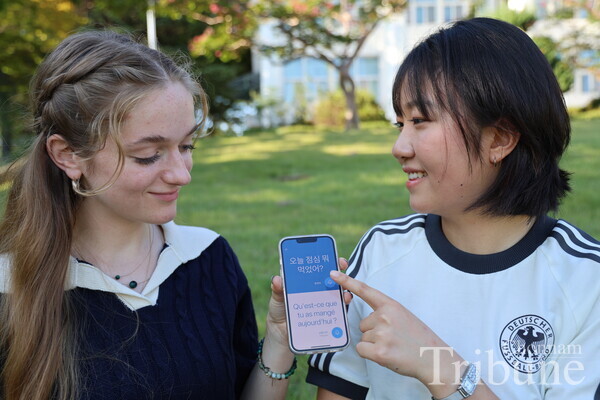
Integrating AI into Everyday Life
AI technology has been visible in a wide range of areas from consumer electronics and online shopping to healthcare, including innovations such as AI-powered medical robotics. It has already, for some time, been quietly yet dramatically changing our daily lives. The influence of AI on our everyday experiences continually grows due to advances in digital devices and customer services, such as virtual assistants and chatbots. In response, the Korean government last April announced that it would allocate 710.2 billion won to projects designed to facilitate the integration of AI into modern life: 18 lifestyle enhancement programs, 24 workplace-related projects, 14 public administration initiatives, as well as additional programs related to education and ethics.
Now, AI technology is also becoming visible in Korean public spaces, with demonstrations of new technologies such as robots and virtual humans being piloted in cities throughout the country. Gwangju is also actively exploring ways to integrate AI into more facets of everyday life, aiming to enhance urban living with smarter, more connected experiences. For example, the Gwangju Tour Bus is an AI-powered service that dynamically adjusts its route based on passenger requests. The AI Smart Farm at Geumnamro 4-ga Station transforms unused subway space into a controlled farming environment for year-round cultivation. An autonomous robot in the Geumnam Underground Shopping Center assists citizens with navigation and provides local information. At Gwangju Sangmu Station, an "AI Virtual Human Kiosk" offers interactive guidance and customer service. Kim Young-bae, who tried the kiosk, told the Tribune, "It is a helpful technology, but it is not in a noticeable location. If more of these kiosks were installed and became widely known, more people, especially the elderly, would use them."
These initiatives show how Gwangju is leading efforts to expand AI from digital and healthcare sectors into everyday urban life. While these are still in the pilot phase, citizens hope that with further development and accessibility, AI could become a more integrated part of their daily experiences.
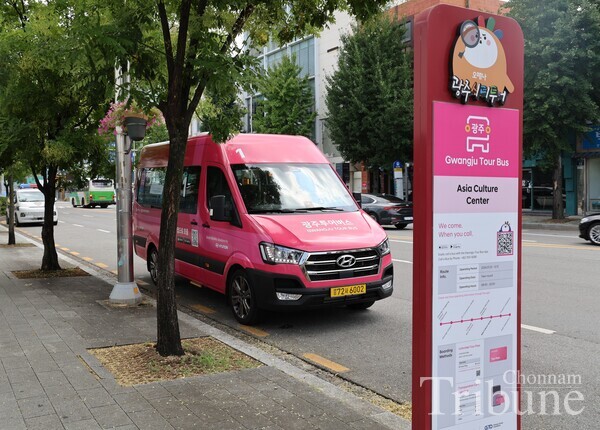
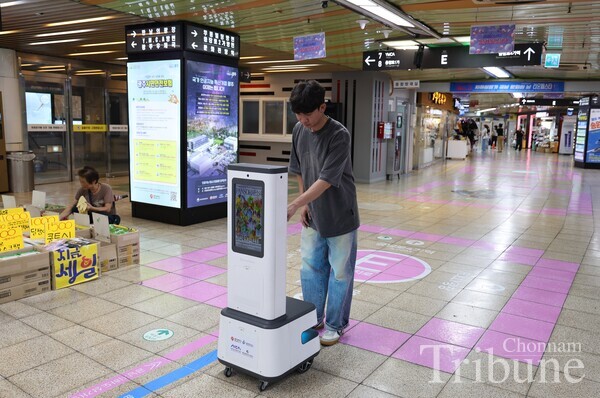
The Importance of AI Literacy
As AI-related technology rapidly advances and is being integrated into all aspects of human life, it presents both incredible opportunities and significant risks, making it a double-edged sword shaping our future. AI has the potential to improve daily conveniences and revolutionize industries, but it can also pose serious threats when misused, raising societal and ethical concerns related to privacy, algorithm bias, personal data protection, and security. For example, AI-generated deepfakes can spread misinformation or damage reputations, leading to ethical dilemmas and societal harms. The misuse of deepfake technology has already resulted in serious crimes such as fraud and sexual exploitation. Before these risks become more prevalent as AI marches toward ubiquity, the need for AI literacy, understanding and managing AI systems safely and ethically, has emerged as a crucial issue.
Given these circumstances, AI literacy is critical in shaping our future. We need the ability to understand and work with, new immersive technologies in ways that improve our lives and societies rather than harming us. AI literacy goes beyond simply knowing how to use AI; it encompasses abilities required to critically evaluate AI-powered tools as well as to discern their benefits, challenges, and ethical implications. As AI increasingly becomes a more significant part of our lives, we have to become educated about its proper use and potential pitfalls so that we can understand the diverse impacts of AI on our everyday lives. AI literacy education is quickly becoming essential for almost everyone, playing a crucial role in helping communities and individuals, especially those in younger generations likely to be more invested in the digital world, recognize the dangers of AI misuse and take responsible actions to mitigate potential harms. Han Tae-hyun (Senior, Dept. of Energy & Resources Engineering) emphasized the necessity of AI literacy education in preventing misuse of technology and solving problems efficiently. He said, "While using ChatGPT for coding tasks in our introductory AI course, I realized that without a proper understanding of AI tools, it is challenging to assess their reliability and recognize their limitations. This experience highlighted the need for AI literacy education."
To address this need, Gwangju and CNU have been developing and implementing educational programs to encourage AI literacy. The Gwangju-Jeonnam University Distance Education Center recently offered one such online course titled "Digital Literacy and ChatGPT." Comprising 15 video lectures, the course aims to familiarize participants with a wide range of sophisticated digital tools, explain the underlying principles of these tools, and guide learners in their effective application throughout various societal contexts. Kim Kyung-baek (Professor, School of Artificial Intelligence), who led the course, noted that "In the past, AI technology was difficult for the general public to access, but since the advent of ChatGPT, it has become more approachable. As a result, people are more easily influenced by AI, making it crucial for them to understand it." He added, "In modern society, digital and AI technologies have become indispensable, which is why digital literacy education is essential. As a leading university in the Jeolla region, it would be beneficial for our institution to take the initiative in providing this type of education."
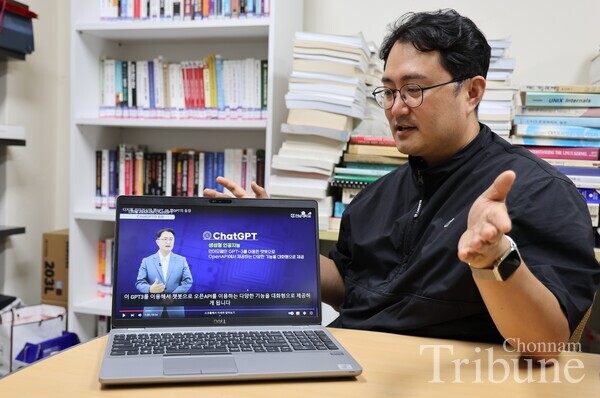
Growing Need for AI Experts
Despite the rapid spread of AI, there remains a significant challenge: a shortage of AI-related experts in Korea. The Global AI Talent Report highlighted this issue four years ago, revealing that Korea was lagging behind a number of other countries at the time, having just 0.5 percent of the world’s AI experts. A recent survey by the Korea Institute of Science and Technology Evaluation and Planning which investigated the R&D of human resources for national strategic technologies showed that Korea had 21,000 AI researchers last year, ranking ninth in the world. Though this represents clear improvement from 2020, the data means the demand for education to cultivate AI experts.
Regarding this challenge, in collaboration with the Ministry of Science and ICT and the Artificial Intelligence Industry Cluster Agency (AIICA), Gwangju has been developing an AI industrial convergence complex in the Cheomdan 3 area. This initiative aims to attract businesses and nurture talent, solidifying Gwangju’s role as a leading AI hub city and highlighting its potential. A central component of this initiative is the AI Convergence Talent Development Program, which includes the AI Convergence University Support Project, AI the AI Advanced Talent Development Project, and AI job transition training.
The Gwangju Artificial Intelligence School (GAIS) is at the heart of this effort, playing a vital role in training the next generation of AI professionals. Since its launch, GAIS has trained 5,788 AI professionals through a rigorous 10-month course, including many with no prior AI experience. This program underscores Gwangju’s commitment to becoming a premier AI-focused city. Ban Su-kyung, head of GAIS, explains, “Our curriculum is designed with real-world applications in mind, ensuring trainees acquire industry-required skills. They work on three major projects and receive mentorship from industry professionals.” Lee Do-yeon, a participant in the second cohort of GAIS, said, “The corporate-linked projects were particularly impressive. I worked on a project analyzing animal biometric data using deep learning computer vision technology. We used real data provided by companies to train and validate AI models, which allowed me to work in an environment mirroring actual industry practices. It was a valuable experience.”
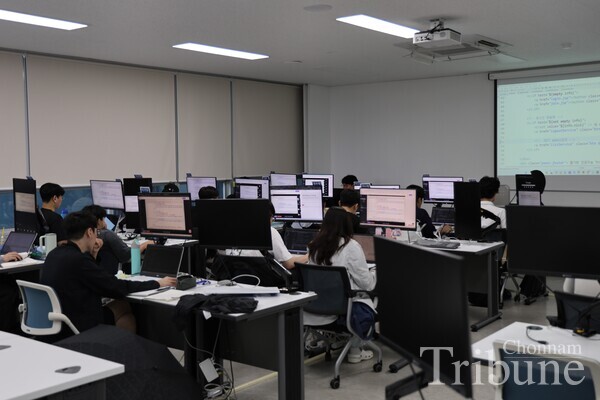
CNU is also making efforts to cultivate the next generation of AI experts crucial for the future. These efforts focus on enhancing technical skills and deepening understanding of AI applications and ethics. The College of AI Convergence at CNU has nurtured experts in the AI field since 2019, with its School of Artificial Intelligence currently cultivating experts related in software, information security, and other sectors. The university is also offering microdegree programs to provide its students from various disciplines with opportunities for AI-related education. The microdegree is a credential earned through small units of coursework, which can be listed on graduation certificates to showcase students' skills. These programs are available to students majoring in IT fields as well as those from other areas. While they are not mandatory, they offer an additional educational path for those with related interests. Additionally, the university runs the "WE-Meet Project," where students tackle real-world problems presented by companies, enhancing their practical job skills and gaining valuable industry experience.
AI’s Risks and Benefits
Currently, the integration of AI into everyday life demands a skilled workforce in this rapidly evolving field. Gwangju's advancements, such as the AI-powered tour bus and Smart Farm, reflect its commitment to becoming a leading AI hub. However, the need for widespread AI literacy and for AI professionals are still significant challenges to address.
Gwangju and CNU are offering targeted educational and training initiatives to cultivate AI literacy and technical AI talents among their communities. It is crucial for students, educators, and industry professionals to actively engage in these programs, as their participation will be vital in developing the expertise needed to navigate and advance the future through AI.
AI technology continues to enhance our experiences by making daily life more convenient and improving connectivity between people, devices, and communities. It has already begun transforming society. Therefore, we have to keep in mind that AI technology presents not just incredible opportunities but also significant dangers, at both everyday life and macrosocial levels. It is essential to consider the potential risks of AI associated with its benefits across all sectors of human life. It may not be limited to some aspects of everyday life and can also threaten to the survival of humanity.
By Oh Hyun-ju, Editor

